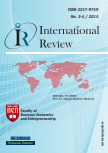Doubts in business communication: Can we transform perception into message
Doubts in business communication: Can we transform perception into message
Author(s): Dragana Jovanović, Vesna Baltezarević, Radoslav BaltezarevićSubject(s): Economy
Published by: Visoka škola za poslovnu ekonomiju i preduzetništvo
Keywords: virtual technology; communication; reality; body; perception; message; digital; media
Summary/Abstract: The communication potential of virtual technology is widely recognized. Here, we review current problems related to developing, evaluating, or using virtual technology in business communication. Business uses of digital technology are broadly understood, but some of the questions we discussed here raise confusion about virtuality and reality, mental illusions, intransitive condition, and impassable boundaries of virtuality - embodied, sensual, singular subjectivity. Virtual communication is far beyond using computer technology, as we know it today. However, we all should be aware of confusion related to computer-mediated perception. From individual perception, communication sometime moves toward contemplative abstraction, which tends to forget its precondition: the original, mediated perceptual-sensuous immediacy of physical existence in the world. Perception is the unmediated directness, original, non-objected participation of organism in the universe. That is existence in unity with things, coexistence with the world. Original or phenomenological, sensory perception is not seen as a sign that the object emits and which informs us about it, or as structures of our brain centers or translation energy pulses in the respective forms - all these ideas are subsequent, second level or secondary metal structures. Perception is not noticed, but modus vivendi, manner of existence, the direct participation in the universe. This is the metaphysical meaning of perception, which doesn't deny the necessity of action, forces us to treat perceptions as a message, but it is secondary and derived meaning that we cannot legitimately absolutize.
Journal: International Review
- Issue Year: 2015
- Issue No: 3-4
- Page Range: 60-66
- Page Count: 7
- Language: English

